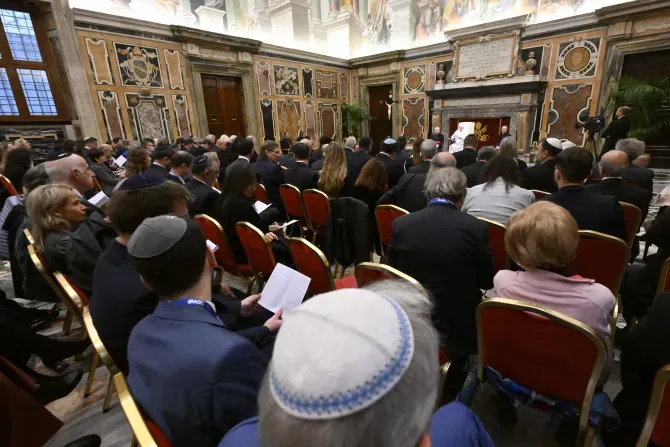
Pope Francis met with international Jewish leaders on Tuesday as they launched an initiative to strengthen Catholic-Jewish bonds.
“This visit testifies to and strengthens the bonds of friendship uniting us,” the pope told members of the World Jewish Congress at the Vatican Nov. 22.
Francis spoke with the executive committee of the international federation of Jewish communities and organizations during its twice annual meeting, which took place in Rome and the Vatican Nov. 21–22.
The World Jewish Congress announced Tuesday that it is starting an initiative called “Kishreinu” (Hebrew for “Our Bond”), “intended to strengthen Jewish-Catholic ties around the globe.”
The Kishreinu initiative, according to the World Jewish Congress, “will serve as the Jewish community’s response to the Nostra Aetate Declaration of the Second Vatican Council.”
Nostra aetate, the council’s declaration on the relation of the Church to non-Christian religions, was a watershed in the history of Christian-Jewish relations.
The document said the Church “rejects nothing that is true and holy” in other religious traditions and encouraged “dialogue and collaboration with the followers of other religions, carried out with prudence and love and in witness to the Christian faith and life.”
In his remarks to the World Jewish Congress executive committee, Pope Francis noted that “from the time of the Second Vatican Council, your Congress has been in dialogue with the Commission for Religious Relations with the Jews, and for many years has sponsored meetings of great interest.”
“We, Jews and Catholics, share priceless spiritual treasures,” he added.
The Kishreinu initiative was launched during a Nov. 22 meeting in the Vatican’s Synod Hall prior to the audience with Pope Francis.
World Jewish Congress president Ronald S. Lauder said he was grateful to the Catholic Church during a time of increasing anti-semitic acts and rhetoric around the world.
“We don’t ignore it. We don’t forget. But we look forward, together. And what could possibly be better for all the children of God to live together in peace, harmony, and in the house of the Lord, forever,” he said.
“Those of us here today,” he said, “are eager to promote our bond with the Catholic Church. Today, we launch the process of ‘Kishreinu,’ [which] reinforces the common future of our two people. It presents a new stage in the Catholic-Jewish bond.”
Cardinal Kurt Koch, president of the Pontifical Council for Promoting Christian Unity, said “with our shared heritage, we have a common responsibility to work together for the good of humankind, refuting antisemitism and anti-Catholic and anti-Christian attitudes, as well as all kinds of discrimination, to work for justice, solidarity, and peace, to spread compassion and mercy in an often cold and merciless world.”
Pope Francis said: “In light of the religious heritage that we share, let us regard the present as a challenge that unites us, as an incentive to act together.”
“Our two communities of faith are entrusted with the task of working to make the world more fraternal, combating forms of inequality and promoting greater justice, so that peace will not remain an otherworldly promise but become a present reality in our world,” he said.
The pope emphasized the importance of justice for building peaceful coexistence in the world.
“How many human beings,” he said, “created in the image and likeness of God, are violated in their dignity as the result of the injustice that racks our world and represents the underlying cause of so many conflicts, the swamp that breeds wars and violence.”
“The One who created all things with order and harmony urges us to cleanse this swamp of injustice that engulfs fraternal coexistence in the world, even as environmental devastations compromise the health of the earth,” he added.
He also pointed out faith’s role in teaching us that every human being is made in the image and likeness of God and said the Scriptures remind us of the importance of inviting God into our actions.
“In other words, our political, cultural, and social initiatives to better the world — what you call Tikkun Olam — will never prove successful without prayer and without fraternal openness to other creatures in the name of the one Creator, who loves life and blesses those who are peacemakers,” he said.
